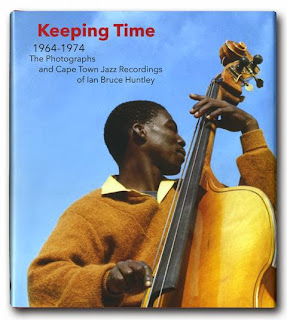Finally - we have arrived at the point where it is possible for Electric Jive to make Ian Bruce Huntley's recordings and photographs available online. To enter the Huntley Archive click on the image of the "Keeping Time" book in the right-hand column of this blog.
We are hoping to continue building and adding to the Huntley Archive on Electric Jive. There are many more of Ian's photos that were not included in the book which, over time, we will digitise and share.
Also, thanks to Rosemary Lombard's eye for detail, Ian has uncovered two more tapes that will be digitised in due course - Tape 42 and Tape 44. For now, you can download just over 56 hours of these historic recordings, you can browse the photos, read reviews of the book, buy the book, and also download a PDF of the book itself. There is place for interaction, comments and contributions from visitors to the site. You can also have archival quality signed copies of the pictures printed and posted to you. Proceeds will go the the Ian Bruce Huntley Trust Fund.
This project has been a collaborative effort of what I like to think of as an ensemble or band of passionate and creative people who together wanted to do something that could not be achieved alone. Ian Huntley as the conductor has always reminded us that none of this would have been possible if it were not for the exceptional dedication and persistence of the musicians themselves. Ian's engagement in this adventure has always been a labour of love, and he is eternally grateful that his musical friends permitted him to photograph and record their music.
Two years ago a non-profit public-good archiving agreement was signed with Ian, undertaking to process and document his archive, to make it accessible on the blog, and to produce a book. The agreement describes our purpose as being “to honour the musicians and their music, to promote the recognition that they are due, and to stimulate wider public interest in and appreciation of this heritage. We do not seek profit or commercial gain in making these recordings available.”
The production of "Keeping Time" and the Huntley Archive on Electric Jive would not have been possible if it were not for the many hours and dedicated contributions of the following good friends - thank you all!Siemon Allen - wizard of visual conception, design, layout, image colour correction and final cropping, chief whip of verification, index and detail;
Jonathan Eato - author, South African Jazz aficionado, networker supreme, additional identifier of musicians photographed, indexer, namer of unidentified tracks, chief producer of enthusiasm;
Cedric Nunn - photo editor, long hours at the computer restoring digital scans of aged, scratched and mouldy images to their former glory;
Matt Temple - always available with insightful design and production suggestions, proof-reading and feed-back;
Rosemary Lombard - foundation design and technical set-up of the Huntley Archive pages. In photographing Ian's tapes and notes, it was Rose that said, "hang-on - there seems to be a tape that has not yet been digitised."
Ilan Lax - musician, lawyer and friend who drafted the agreement with Ian and did the paperwork in establishing the Ian Bruce Huntley Trust Fund.
Thank you to Matt, Jonathan and Siemon for doubling up as post and packaging workers in distributing the books from London and in the USA.
Thank you also to Andrew Arbuckle for his photographs of Ian's Tandberg Tape Recorder - and also for being Ian's Pietermaritzburg friend who shows Ian the website and lets him see what is happening on it.
Please engage, enjoy and celebrate this heritage.
Chris Albertyn March 2014






















